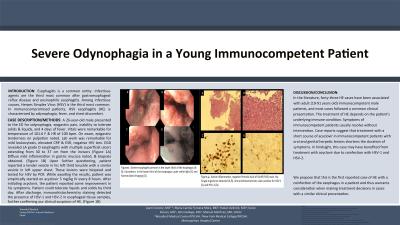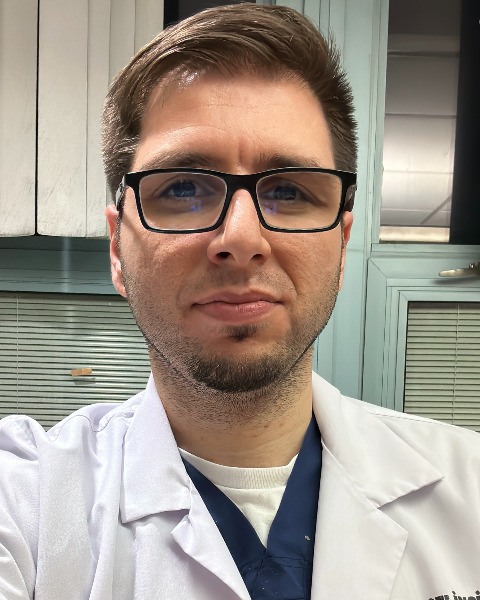Sunday Poster Session
Category: Esophagus
P0580 - Severe Odynophagia in a Young Immunocompetent Patient
Sunday, October 27, 2024
3:30 PM - 7:00 PM ET
Location: Exhibit Hall E

Has Audio

Hakan Gelincik, MD
NYC Health + Hospitals/Woodhull
Brooklyn, NY
Presenting Author(s)
Lyam Ciccone, MD1, Maria Camila Fonseca Mora, MD2, Hakan Gelincik, MD2, Gulce Karaca, MD2, John Gallego, MD2, Manuel Martinez, MD, FACG2
1NYC Health + Hospitals/Metropolitan, New York, NY; 2NYC Health + Hospitals/Woodhull, Brooklyn, NY
Introduction: Esophagitis is a common entity. Infectious agents are the third most common after gastroesophageal reflux disease and eosinophilic esophagitis. Among infectious causes, Herpes Simplex Virus (HSV) is the third most common. In immunocompromised patients, HSV esophagitis (HE) is characterized by odynophagia, fever, and chest discomfort.
Case Description/Methods: A 26-year-old male presents to the emergency room for odynophagia and epigastric pain, inability to tolerate solids and liquids, and four days of fever. Vitals were remarkable for the temperature of 101.6 F and heart rate of 100 bpm. On physical exam, epigastric tenderness on palpation was noted. Laboratory work was remarkable for mild leukocytosis, elevated CRP and ESR, and negative HIV test. Upper endoscopy revealed Los Angeles grade D esophagitis with multiple superficial ulcers extending from 30 to 37 cm from the incisors. (Figure 1) Diffuse mild inflammation in the gastric mucosa was noted, and biopsies were obtained. (Figure 2) Upon further questioning, the patient reported a tender vesicle in his left third knuckle with a similar vesicle in the left upper chest. These lesions were biopsied and tested for HSV by PCR. While awaiting the results, the patient was empirically started on acyclovir 5 mg/kg intravenously every 8 hours. After initiating acyclovir, the patient reported some improvement in his symptoms. The patient could tolerate liquids and solids by the third day of treatment. After discharge, immunohistochemistry staining detected the presence of HSV-1 and HSV-2 in the esophageal tissue samples, further confirming our clinical suspicions of HE. (Figure 2)
Discussion: In the literature, forty-three HE cases have been associated with adult (19-91 years old) immunocompetent male patients, and most cases followed a common clinical presentation. The treatment of HE depends on the patient's underlying immune condition. Symptoms of immunocompetent patients usually resolve without intervention. Case reports suggest that treatment with a short course of acyclovir in immunocompetent patients with oral and genital herpetic lesions shortens the duration of symptoms. In hindsight, this case may have benefited from treatment with acyclovir due to coinfection with HSV-1 and HSV-2.
We propose that this is the first reported case of HE with a coinfection of the esophagus in a patient and thus warrants consideration when making treatment decisions in cases with a similar clinical presentation.

Disclosures:
Lyam Ciccone, MD1, Maria Camila Fonseca Mora, MD2, Hakan Gelincik, MD2, Gulce Karaca, MD2, John Gallego, MD2, Manuel Martinez, MD, FACG2. P0580 - Severe Odynophagia in a Young Immunocompetent Patient, ACG 2024 Annual Scientific Meeting Abstracts. Philadelphia, PA: American College of Gastroenterology.
1NYC Health + Hospitals/Metropolitan, New York, NY; 2NYC Health + Hospitals/Woodhull, Brooklyn, NY
Introduction: Esophagitis is a common entity. Infectious agents are the third most common after gastroesophageal reflux disease and eosinophilic esophagitis. Among infectious causes, Herpes Simplex Virus (HSV) is the third most common. In immunocompromised patients, HSV esophagitis (HE) is characterized by odynophagia, fever, and chest discomfort.
Case Description/Methods: A 26-year-old male presents to the emergency room for odynophagia and epigastric pain, inability to tolerate solids and liquids, and four days of fever. Vitals were remarkable for the temperature of 101.6 F and heart rate of 100 bpm. On physical exam, epigastric tenderness on palpation was noted. Laboratory work was remarkable for mild leukocytosis, elevated CRP and ESR, and negative HIV test. Upper endoscopy revealed Los Angeles grade D esophagitis with multiple superficial ulcers extending from 30 to 37 cm from the incisors. (Figure 1) Diffuse mild inflammation in the gastric mucosa was noted, and biopsies were obtained. (Figure 2) Upon further questioning, the patient reported a tender vesicle in his left third knuckle with a similar vesicle in the left upper chest. These lesions were biopsied and tested for HSV by PCR. While awaiting the results, the patient was empirically started on acyclovir 5 mg/kg intravenously every 8 hours. After initiating acyclovir, the patient reported some improvement in his symptoms. The patient could tolerate liquids and solids by the third day of treatment. After discharge, immunohistochemistry staining detected the presence of HSV-1 and HSV-2 in the esophageal tissue samples, further confirming our clinical suspicions of HE. (Figure 2)
Discussion: In the literature, forty-three HE cases have been associated with adult (19-91 years old) immunocompetent male patients, and most cases followed a common clinical presentation. The treatment of HE depends on the patient's underlying immune condition. Symptoms of immunocompetent patients usually resolve without intervention. Case reports suggest that treatment with a short course of acyclovir in immunocompetent patients with oral and genital herpetic lesions shortens the duration of symptoms. In hindsight, this case may have benefited from treatment with acyclovir due to coinfection with HSV-1 and HSV-2.
We propose that this is the first reported case of HE with a coinfection of the esophagus in a patient and thus warrants consideration when making treatment decisions in cases with a similar clinical presentation.

Figure: Figures 1 and 2
Disclosures:
Lyam Ciccone indicated no relevant financial relationships.
Maria Camila Fonseca Mora indicated no relevant financial relationships.
Hakan Gelincik indicated no relevant financial relationships.
Gulce Karaca indicated no relevant financial relationships.
John Gallego indicated no relevant financial relationships.
Manuel Martinez indicated no relevant financial relationships.
Lyam Ciccone, MD1, Maria Camila Fonseca Mora, MD2, Hakan Gelincik, MD2, Gulce Karaca, MD2, John Gallego, MD2, Manuel Martinez, MD, FACG2. P0580 - Severe Odynophagia in a Young Immunocompetent Patient, ACG 2024 Annual Scientific Meeting Abstracts. Philadelphia, PA: American College of Gastroenterology.
